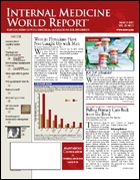Publication
Article
Internal Medicine World Report
Nonphysician Providers %u201CScope of Practice%u201D Continues to Expand
Nonphysician Providers “Scope of Practice” Continues to Expand
By Ronald L. Scott
State legislators continue to expand the legal scope of practice allowed by state licensure laws for nonphysician providers. A 2004 year-end report by the National Conference of State Legislators’ Health Policy Tracking Service summarized scope of practice legislation from 1999 through 2004, and the trends are clear. Nurses, dentists, optometrists, physician assistants, dental hygienists, pharmacists, physical therapists, podiatrists, psychologists, and respiratory care practitioners have been quite successful in convincing state legislators to expand their scope of practice privileges.
The usual argument for expanding scope of practice is mostly economic. A licensed practical nurse (LPN) can provide patient care more cheaply than a registered nurse (RN) can; a physician assistant can provide care more cheaply than a physician, etc. Patient safety is at issue in every turf battle over scope of practice privileges, so legislators sometimes incorporate additional or continuing education for nonphysician providers who wish to perform certain procedures. It is also common to require that some nonphysician providers be supervised more closely when performing certain procedures. For example, Massachusetts and Michigan now allow dental hygienists to administer nitrous oxide, but only under the supervision of a dentist. Furthermore, Michigan requires hygienists to complete additional professional training in the administration of anesthesia. Dentists have sought and sometimes obtained authority to prescribe and administer deep sedation or general anesthesia.
Licensure of nurses has become increasing complex, with several classes of licenses ranging from LPNs and RNs and several categories of advanced practices nurses (APNs) including nurse practitioners, clinical nurse practitioners, nurse clinicians, nurse midwives, and nurse anesthetists. Some legislation regarding nurses’ scope of practices focuses on the clinical setting. For example, Wisconsin allows hospice nurses to make a pronouncement of death if the patient is under the care of a physician at the time of death and the death was anticipated. Virginia allows nursing home nurses to make pronouncements of death. School nurses are sometimes allows to administer medication to students (with a parent’s permission) based on a physician’s instructions.
Several classes of APNs have been granted expanded prescriptive authority during the 1999 to 2004 period. Laws sometimes allow APNs to distribute pharmaceutical companies’ sample drugs. Several states allow APNs to dispense noncontrolled prescription drugs and some allow them to dispense certain classes of controlled substances. Again, some of the laws expand prescriptive authority depending on the clinical setting. For example, New Mexico allows APNs to serve as a primary end-of-life health care provider in partnership with physicians and other health care providers as necessary.
Battles over optometrists’ scope of practice privileges have been intense. Oklahoma enacted legislation in 2004 allowing optometrists to perform some laser surgery procedures. A Veterans Affairs hospital in Kansas then authorized an optometrist licensed in Oklahoma to perform laser surgeries. Because of objections raised by the American Medical Association, ophthalmologists, and veterans’ groups the Department of Veterans Affairs rescinded the authorization.
The health policy implications of the myriad regulatory approaches to nonphysician scope of practice are not well understood. An APN moving from one state to another may find his or her scope of practice privileges expanded or seriously curtailed. In contrast to the wide variation in scope of practice for nonphysician providers, physicians’ scope of practice privileges vary little from state to state. States are acting as laboratories as they continue to expand practice privileges. Hopefully, the focus on evidence-based medicine will eventually provide empirical evidence to influence the ongoing legislative debates over scope of practice.
